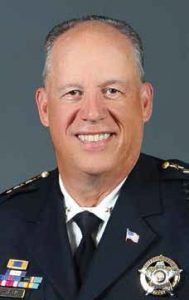Español Français Português عربى |

As law enforcement executives, we are well aware that leading in today’s environment is a complex and challenging job. With increasing demands, internal and external pressures, and ever-changing technologies, the profession continues to evolve, growing more multifaceted every day. With these rising expectations, it is vital that we, as leaders, strive to be our best and exemplify the finest.
Leadership, at its simplest, is the ability for one to direct another on a course or in a direction—the ability to influence how another behaves. But, as leaders, we know that how one accomplishes this makes the difference. A rigid and authoritative leader may be successful in altering the behaviors of his or her officers, but at what cost to the overall culture and environment of the police department? Leadership entails developing trust and respect within your organization—building an environment in which people feel comfortable expressing their beliefs and concerns and taking responsibility for mistakes when something goes wrong. As Simon Sinek states, “Leadership has nothing to do with being in charge; it is about taking care of those in your charge.”
In influencing the behaviors of others, effective leaders are also invested in their growth. Successful leaders have a desire to share knowledge and encourage development, pushing others to reach their highest potential. To help in this endeavor, IACP has worked to develop a range of leadership resources, from professional services like resume reviews and interview training to articles featuring the latest research and ideas. IACP’s programs, such as Leadership in Police Organizations (LPO) and Women’s Leadership Institute (WLI), further aid in the development of our future leaders, providing trainings focused on evidence-informed theories and practices that teach others how to inspire and motivate, serve with compassion and virtue, and lead by example. Through presentations like the IACP Leadership Awards and the 40 Under 40 Awards, the IACP also gives organizations a chance to recognize up-and-coming leaders, providing a venue in which to spotlight their accomplishments and professional development.
But while many can exude positive leadership traits when times are good, it’s the hard times that truly test a leader’s capabilities. As leaders, we often must take on difficult issues, including those outside of our comfort zone. We must be able to make the right decision even when it is not the easiest one, to admit what we do not know, and to stand up for what is best even if it is not popular. We must be courageous leaders.
We must be able to make the right decision even when it is not the easiest one, to admit what we do not know, and to stand up for what is best even if it is not popular. We must be courageous leaders.
While many may pride themselves in being successful leaders, there are far less who are fluent in courageous leadership. Being a courageous leader means being vulnerable, and few of us are comfortable with that. The challenges we face as leaders of law enforcement organizations expose us to a multitude of pressures and perspectives. It is through these situations that we must continually look for the greatest good and be willing to speak up for what is right even when it causes backlash or contempt. Leading with courage is hard, and it is during these situations that our true leadership ability is tested.
Courageous leadership also means making mistakes. It means that, in high-risk situations, we may not always make the best decision, despite our best intent. It’s during times like these that open communication is crucial—taking time to speak honestly about what went wrong, where it went wrong, and how it could have been avoided. Form relationships with those you work closely with, and give them the responsibility of holding you accountable. Remain open to their ideas and opinions, even when they are in direct disagreement with your own.
In her book, Dare to Lead, Brene Brown speaks to courageous leadership:
When we dare to lead, we don’t pretend to have the right answers; we stay curious and ask the right questions. We don’t see power as finite and hoard it; we know that power becomes infinite when we share it with others. We don’t avoid difficult conversation and situations; we lean into vulnerability when it’s necessary to do good work.
As leaders of the law enforcement field today, we find ourselves leading our profession and our agencies in a time of accelerating change and increasing disruption. Calls for police reform, protests in our communities, and expanded calls for service beyond law enforcement’s traditional duties add to the challenges of the profession. As the pressures from both internal and external forces continue to build, deciphering the best path forward grows only harder. Perhaps today, more than ever, courageous leadership is needed. d
Please cite as
Steven R. Casstevens, “Leading With Courage,” President’s Message, Police Chief 87, no. 1 (January 2020): 6–7.


